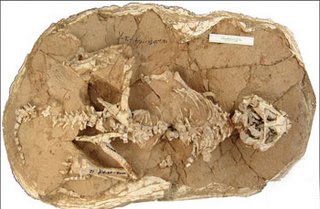Rareresource
Thursday, September 18, 2008
Will the actual dinosaurs stand up in science?
 Most of the recently discovered dinosaurs are just that - new to science, a review concludes. With several past fossil finds named on the basis of partial remains, there has been concern that numerous double counting has been happening. Current studies had even puts forward this error rate may be as high as 50% - with some species being catalogued with a number of aliases.
Most of the recently discovered dinosaurs are just that - new to science, a review concludes. With several past fossil finds named on the basis of partial remains, there has been concern that numerous double counting has been happening. Current studies had even puts forward this error rate may be as high as 50% - with some species being catalogued with a number of aliases.However the journal Biology Letters reports that modern practice is at present very good. Professor Michael Benton from Bristol University, UK said "My research plans we're getting better at naming things; we're being more serious; we're using better material".
The scientist looked at the innovative descriptions of all 1,047 species of dinosaurs yet named, from 1824 to the present calendar day. He assessed the value of the specimens on which the names were founded - the kind specimens. Professor Benton said few 500 were truly distinct, and the confidence surrounding the most recent discoveries - about one new species a fortnight - was currently very high. Professor Benton explained that "The bane of the dinosaurologist's life is species that have been given named on the basis of unfinished specimens".
"In Victorian times, palaeontologists were dedicated to name new species, and in the animation of the great 'bone wars' for instance, from 1870 to 1890, they rushed into print with new names for each odd tooth, leg bone, or skull cap that came their manner. "Later work, on added complete specimens, reduced over 1,000 named dinosaurs to 500 or so".
Professor Benton said science had currently put in place far more accurate naming protocols, noticeably reducing the "alias problem". Since in 1960, the great greater part of new species are founded on more or less complete specimens, occasionally even whole skeletons. Professor Benton has a critical interest in the topic for the reason that he studies the evolution of dinosaurs. He tries to recognize how this famous animal group changed and diversified over roughly 200 million years.
"There's no point someone like myself doing big statistical analyses of numerous dinosaur species through time - or indeed any other fossil group - if you can't be sure that they really are genuinely different," he told BBC News. "This is essential moreover for studies of modern biodiversity. People have as well been looking at our present knowledge of mammals and insects and other animal groups and asking the easy question: are the species totals and lists we make use of for important conclusions - including to give the political advice about endangered species - are they right? "There's been a big debate regarding vast extinctions among amphibians. We have to know what the species are first, prior to we can converse about that”.
Source: news.bbc.co.uk

